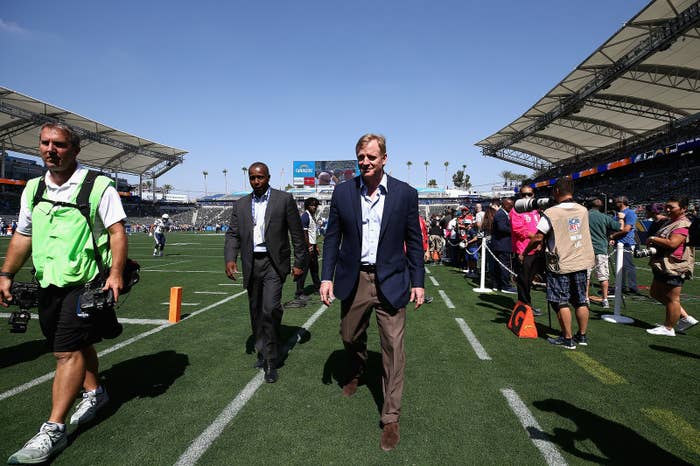
Officials inside the National Football League are characterizing Tuesday’s meeting in New York City between players, league officials, and representatives from the NFL as an important step in a process that began 14 months ago — and are hoping that the league actively backing bipartisan legislation that seeks to drastically limit mandatory-minimum sentences will be a major change.
But plenty of questions remain about the rest of the regular season and the relationship between players, owners, the league, and politics.
The NFL will not require players to stand for the national anthem, and commissioner Roger Goodell has said publicly that the players who demonstrate are not trying to disrespect the flag. But he said it was his intention to get the number of players demonstrating openly to zero.
The kneeling issue didn’t come up Tuesday, the league sources said. For all of the momentum going into today’s meeting, the league sources insist that it’s still up to each individual player whether to kneel in protest during the national anthem. Goodell said Wednesday that ultimately, a half-dozen players have been consistently kneeling and that the goal of the dialogue between the league and players is to get that number down to zero. “We believe everyone should stand for the national anthem. We think our fans expect us to do that.”
The sources confirmed that the player coalition in the meeting invited former quarterback Colin Kaepernick but he did not show. The league sources said there was a sense in the room that they should focus on “who's in the room and not on who's not.”
On Wednesday, White House press secretary Sarah Huckabee Sanders called the NFL policy statement "a step in the right direction," before Trump chimed in with an authoritarian-style message that has irked NFL players and coaches around the league: “@NFL: Too much talk, not enough action. Stand for the National Anthem.”
The meeting Tuesday was led by former player and executive vice president of NFL football operations Troy Vincent. According to a pair of league sources present in the meeting, the league and players’ coalition centered any progress moving forward around three main focal points: refining a policy platform and ways to amplify it as a follow-up to players’ protests; creating ways for NFL players and entities to participate and engage in education inside communities; and creating partnerships to assist players in addressing public policy.
The pair of league sources said that over the past 14 months, Goodell has gotten “a great deal of clarity on what’s driving players to take a knee on Sundays, Mondays, and Thursdays,” and that one of the issues is criminal justice reform. To that end, Goodell went on a ride-along with police in Miami as well as a “listen-and-learn” session in Philadelphia.
The league sources said the NFL had been particularly interested in one part of the bill that creates a commission that would review the entire criminal justice system. One player in particular, Seattle Seahawks wide receiver Doug Baldwin, was the driving force behind trying to get the league to support the legislation, according to a source with knowledge of the situation. Baldwin, a Stanford graduate, is said to have impressed league brass with his knowledge of the issue.
Goodell, asked Wednesday at a press conference to address his understanding of the players’ concerns, failed to include anything in his answer anything about police brutality. In fact, police brutality — especially tragic encounters concerning black Americans like Philando Castile and Sandra Bland — has especially animated players in the NFL, and was the stated reason Kaepernick initially knelt during the national anthem.
“Communities of color have also had to watch video after video of unarmed black men and women being handled without regard for their lives or well-being,” Eagles defensive player Malcolm Jenkins wrote in an op-ed in the Washington Post. “As a black man, I see these images and I see myself; I wonder whether this will happen to me or one of my loved ones. In honor of their names, we are joining the fight for change. We are demanding police transparency and accountability so we can build trust and work together to make our communities safer.”
The sentencing overhaul bill, by Sens. Chuck Grassley of Iowa and Dick Durbin of Illinois, aims to limit mandatory-minimum prison sentences, limiting the steepest penalties to drug and violent offenders and the most serious drug crime offenders.
At the very least, the meetings this week add some new elements into the what has become familiar this fall: demonstrating during the national anthem. A source with knowledge familiar with the discussions told BuzzFeed News that the NFL might create something unheard of in professional sports: its own racial justice platform.
